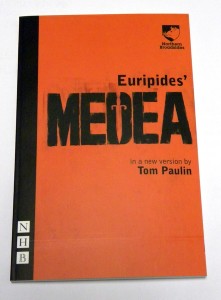


I know that woman, aye,Īnd dread her! Will she creep alone to dieīleeding in that old room, where still is laid Her heart is no light thing, and useth not Most tremble, lest she do I know not what. Methinks she hath a dread, not joy, to see She knoweth now how rare a thing that was! Of father, and land, and home, forsook that dayįor this man's sake, who casteth her away. May writhe, and all alone she moans the name Than some dead rock or wave that beats the shore: Her days a waste of weeping, she hath lain, On God in heaven to mark the end, and how The troth surpassing speech, and cries amain They two, and wakes the claspèd hands again,

Wed with this Creon's child, who now is headĪnd chief of Corinth. My mistress and his own two sons, to make Through all ill days, the hurts of humankind,īut now, the world is angry, and true love Stood friend to her, and she in word and deed Hunted for that fierce sin, to Corinth here To spill their father's life: nor fled in fear, The daughters of King Pelias, knowing not, With love of Jason, to the encastled shore Mine own princess, her spirit wounded sore The fleece All-golden! Never then, I trow, Valiant, who won, to save King Pelias' vow, Shaped that first oar-blade in the hands of men Would God no Argo e'er had winged the seas A road to the right leads towards the royal castle, one on the left to the harbour. The play holds the American Theatre Wing's Tony Award record for most wins for the same female lead character, with Judith Anderson winning in 1948, Zoe Caldwell in 1982, and Diana Rigg in 1994.The Scene represents the front of Medea's House in Corinth. It experienced renewed interest in the feminist movement of the late 20th century, being interpreted as a nuanced and sympathetic portrayal of Medea's struggle to take charge of her own life in a male-dominated world. The play was rediscovered with Rome's Augustan drama again in the 16th-century then remained part of the tragedic repertoire, becoming a classic of the Western canon, and the most frequently performed Greek tragedy in the 20th century. Some believe that this indicates a poor reception, but "the competition that year was extraordinarily keen" Sophocles, often winning first prize, came second. Medea, along with three other plays, earned Euripides third prize in the City Dionysia. Poster by Alfons Mucha for performance by Sarah Bernhardt in Medée at the Théâtre de la Renaissance, Paris (1898)Įuripides' play has been explored and interpreted by playwrights across the centuries and the world in a variety of ways, offering political, psychoanalytical, feminist, among many other original readings of Medea, Jason and the core themes of the play.


 0 kommentar(er)
0 kommentar(er)
